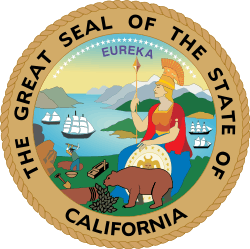California Proposition 55 (2016)
| Elections in California | ||||||||||
|---|---|---|---|---|---|---|---|---|---|---|
 | ||||||||||
|
||||||||||
|
||||||||||
Proposition 55 is a California ballot proposition on the November 8, 2016 ballot regarding extending by twelve years the temporary personal income tax increases enacted in 2012 on earnings over $250,000, with revenues allocated to K–12 schools, California Community Colleges, and, in certain years, healthcare.[1] Proposition 55 would raise tax revenue between $4 billion to $9 billion a year.[2] Half of funds would go to schools and community colleges, up to $2 billion a year would go to Medi-Cal, and up to $1.5 billion would be saved and applied to debt.[2]
California voters passed the temporary California Proposition 30, 2012.[3] During the temporary tax, California’s top 1% of earners paid half of the state’s income-taxes and contributed one third of its budget.[3] Since the 2012 tax increase, California’s tax revenues have grown by nearly 30%, with roughly two third’s of the money going to schools.[3] Proposition 55 would increase rates and extend the tax until 2030.[3] Governor Jerry Brown, who was the primary proponent of the tax increase in 2012, has remained neutral on Proposition 55.[4]
Proponents have spent $56.8 million fighting for the measure, with the top donor being $25 million from a hospital trade association.[2] An additional $20 million has been donated by the California Teachers Association, with other top donors including the Service Employees International Union, and the California School Employees Association.[2] The measure is supported by the editorial board of the Sacramento Bee.[5]
Opponents have spent $3,000 fighting against the measure.[2] The California Chamber of Commerce, who were neutral on the 2012 tax increase, are opposed to Proposition 55.[4] The measure is opposed by the editorial boards of the Los Angeles Times[6] the San Francisco Chronicle,[7] and the Wall Street Journal.[3]
A September 2016 poll by the Public Policy Institute of California showed that 54% of likely voters supported Proposition 55, 38% opposed it, and 8% did not know how they would vote.[8]
Proposition 55 was approved by voters in the November general election, with 62% yes.[9]
References
- ↑ "Proposition 55. California General Election November 8, 2016. Official Voter Information Guide. California Secretary of State". Legislative Analyst's Office. Retrieved 10 October 2016.
- 1 2 3 4 5 Lagos, Marisa. "Election 2016: Proposition 55". KQED News. Retrieved 20 October 2016.
- 1 2 3 4 5 The Editorial Board of the Wall Street Journal (26 October 2016). "The State Taxathon". The Wall Street Journal. Retrieved 27 October 2016.
- 1 2 Adler, Ben (25 October 2016). "Proposition 55 May Be Good Politics, But Is It Good Policy?". Capital Public Radio. Retrieved 27 October 2016.
- ↑ The Editorial Board of the Sacramento Bee (24 September 2016). "'Yes' on Proposition 55 tax, unenthusiastically". The Sacramento Bee. Retrieved 20 October 2016.
- ↑ The Editorial Board of the Los Angeles Times (1 October 2016). "Don't tie California's fate to Wall Street volatility. Vote no on Proposition 55". Los Angeles Times. Retrieved 20 October 2016.
- ↑ The Editorial Board of the San Francisco Chronicle (9 September 2016). "Chronicle recommends: No on state Prop. 55". San Francisco Chronicle. Retrieved 20 October 2016.
- ↑ Baldassare, Mark (September 2016). "Californians & Their Government: Statewide Survey" (PDF). Public Policy Institute of California. Retrieved 11 October 2016.
- ↑ Pritchard, Justin (9 November 2016). "Tax the rich for education? California votes 'yes'". The Sacramento Bee. Retrieved 11 November 2016.
External links
- Yes on 55 - Californians for Budget Stability
- No on Proposition 55
- Proposition 55 Would Extend Prop 30 Income Taxes to Fund Schools, Health Care Discussion on Forum (KQED)